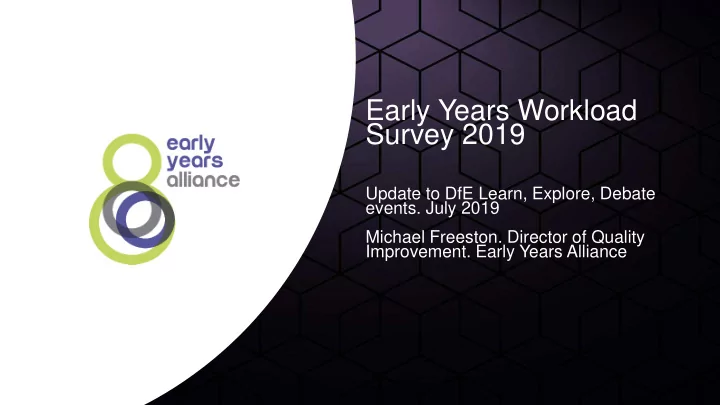

Early Years Workload Survey 2019 Update to DfE Learn, Explore, Debate events. July 2019 Michael Freeston. Director of Quality Improvement. Early Years Alliance
74% regularly stressed about work 57% suffered anxiety 26% depression 61% no work-life balance 2% (45 people) thought of ending their own lives 76% cited paperwork and administration as a regular source of stress
Focus groups Focus groups “ I had a member of staff leave last month because of paperwork, two are suffering from mental health issues and it ’ s all work related stress. It caused me to have a divorce, working 50 hours a week and every weekend, late at night, writing reports. I have a four year old and just bought a new house which I ’ ve yet to see inside as I don ’ t have time. ”
National survey • Commenced 8 th April for 1 month • 1,300 responses
Online survey key findings • 84% spend ‘too much’ or ‘far too much’ time on paperwork • Sessional settings were the most likely to say they spend ‘too much’ or ‘far too much’ time on paperwork (89%), though percentages were relatively similar across provider types. • Full daycare settings = 80% • Childminder professionals = 82% • Maintained settings = 85%.
…findings continued • 52% felt paperwork expectations ‘not at all’ or ‘not really’ consistent across Ofsted inspections • 81% felt ‘somewhat’ or ‘very’ confident about incidents, concerns or changes to report to Ofsted • 42% had conflicting information from different agencies or organisations about reporting requirements • 37% disagreed completely or somewhat that paperwork required for local authority is reasonable • 20% said they had to produce paperwork for their local authority which duplicates other paperwork
Types of paperwork Observations/assessments 65% Learning journeys 62% Self-evaluation evidence 53% Curriculum planning 52% Cohort tracking 41% Staff supervision 39% EYFS (two year) progress check 34% SEND funding applications 33% SEND action plans 27% Transitions to school 27%
Is this a picture you recognise? Are you in the 84% spending ‘too much’ or ‘far too much’ time on paperwork? Are there other types of paperwork demands that you would include on the list?
Paperwork – Childminder professional Childminders were most likely to cite the following paperwork types as overly-burdensome or excessive: • Self-evaluation evidence (cited by 68% of childminders vs 45% full daycare settings, 54% sessional settings and 26% maintained settings) • EYFS 2-year progress check (43% vs full daycare (29%), sessional (35%) and maintained (13%)
Paperwork - Childminder professional • Observations and assessments (72% vs 61% full daycare, 61% sessional and 67% maintained) • Learning journeys (71% vs 55% full daycare, 60% sessional and 59% maintained) • Parental feedback (34% vs 16% full daycare, 18% sessional and 15% maintained)
Paperwork – Full daycare and maintained • Maintained settings were the most likely to cite ‘curriculum planning’ paperwork as overly -burdensome or excessive (67% vs 48% full daycare, 53% sessional and 52% childminders) • Incident logs were more frequently cited by maintained (26%) and full daycare (23%) compared to sessional (16%) and childminders (16%)
Why produce more paperwork than is necessary? 59% to meet my/our own best practice standards
Paperwork sources of information When asked where they get information on paperwork requirements from: • DfE (31% childminders; 42% full daycare, 42% sessional and 40% maintained); • Ofsted (44% maintained setting, 71% full daycare, 77% sessional and 75% childminder) • LA (Sessional settings 76%, 64% full daycare, 62% childminder, 49% maintained)
Paperwork sources of information • Other practitioners spoken to in person (57% childminders, 18% full daycare, 34% sessional and 16% maintained), • Other practitioners on social media (60% childminders, 13% full daycare, 22% sessional, 9% maintained)
Other comments • Childminders and sessional settings were the most likely to say that their last Ofsted inspector focused ‘too much’ or ‘far too much’ on paperwork (childminders = 38%, sessional = 34%, vs 27% full daycare and 29% maintained) • Sessional settings were the most likely to say that they had received conflicting information from different agencies or organisations about reporting requirements (48% vs 41% full daycare, 39% childminder and 39% maintained)
Potential next steps: recommendations 1. Inspector audit 2. Update training processes 3. Produce official guidance 4. An audit of all local authorities to find out what paperwork requirements 5. Formal process of challenge 6. Positive LA case studies 7. Single, central guide to what needs reporting 8. Central guidance on best practice with regard to paperwork, specifically in terms of evidencing child observations
Recommend
More recommend